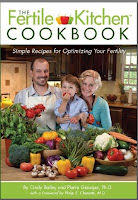There is a lot of information out there about supplements to boost fertility. I for one believe supplementation makes a big difference. I'll share with you the supplements I took, but please keep in mind that everyone is different and has unique needs. I encourage you to do some of your own research.
- Pre-natal vitamin - for women, to ensure sufficient levels of folic acid and other key nutrients to support a developing fetus. Ideally, this should be started months before you plan to be pregnant. (I was on them for years, waiting for that pregnancy to arrive.)
- Vitamin C (1,000 mg./day) - said to improve hormonal levels; its antioxidant properties helps protect cells and strengthen the immune system; and for men, this vitamin improves sperm count, motility and viability.
- B-100 complex (1 capsule/day)- includes B12, B6 and folic acid, all of which improve reproductive health and fertility
- Royal Jelly (500 mg/day) - nutrient-rich bee products that help stimulate fertility
- L-Arginine (2,000 mg 2x/day) - an amino acid essential for sperm production; shown to increase fertility in women.
- Coenzyme Q10 (100mg./day ) increases sperm count; may increase egg quality.
- Vit.E (400 i.u./day) - another pwerful antioxidant that increases fertility for men and women; may increase egg quality; studies show that this vitamin can increase sperm potency by 2 ½ times.
- Selenium (200 mcg./day) - This mineral is an antioxidant that helps protect against free radicals as well as help increase sperm counts in men that have low counts.
- Zinc (about 15 mg./day) is also helpful to fertility, but it gives me a bad reaction (as a supplement), so I didn't take it. Zinc is important for maintaining the production of testosterone in men, and in women, it helps the body use estrogen and progesterone more efficiently. Too much zinc can be toxic, so I would stick with the zinc that may already be in your pre-natal vitamin, and look for zinc sources in food: red meat (eat only organic, lean portions!) and seafood.
An wonderful additional source on supplements here at BellaOnline.
Other links: Natural Treatments with Vitamins and the fertility shop.
photo by www.sia-hq.com/






